5 Books Making News This Week: Putin, the Nobel, and the Greatest
Masha Gessen, Kasuo Ishiguro, Jonathan Eig, and More
The Nobel Prize in Literature goes to Kazuo Ishiguro,“who, in novels of great emotional force, has uncovered the abyss beneath our illusory sense of connection with the world.” The National Book Award fiction finalists are Elliot Ackerman’s Dark at the Crossing, Lisa Ko’s The Leavers, Min Jin Lee’s Pachinko, Carmen Maria Machado’s Her Body and Other Parties: Stories, and Jesmyn Ward’s Sing, Unburied, Sing. Machado’s first story collection also wins the Bard Fiction Prize. Nobel laureate Ishiguro’s Never Let Me Go may be his masterpiece, Russian-American journalist Masha Gessen’s new book deconstructs Putin’s Russia, Joni Mitchell’s biographer digs beneath the surface, Jonathan Eig’s Ali does justice to a man of many faces, and Josephine Rowe’s first novel traces the trauma of the Vietnam War through several generations.
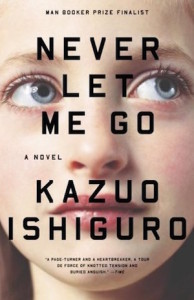
Kazuo Ishiguro, Never Let Me Go
Born in Nagasaki, raised in England, the new Nobel laureate Ishiguro first drew attention with Remains of the Day, but his greatest book so far, some critics say, is Never Let Me Go.
“Never Let Me Go is Ishiguro’s masterpiece and the first great novel of the 21st century,” writes Laura Miller (Slate). “Part medical thriller, part boarding-school adventure, it is narrated by Kathy, whose voice and way of looking at the world are evidently banal. What initially seems like an insuperable aesthetic handicap in the novel’s prose becomes, by the end of the book, one of its most morally powerful elements. Kathy’s situation is anything but average. She and her fellow schoolmates at Halisham are clones, destined, once they reach adulthood, to have their organs harvested until they reach “completion.” Although they cling to the notion that Hailsham and its residents are something special, Kathy and her friends are not the stuff that dystopian YA heroes are made of. They have no exceptional talents or abilities, no rebellious determination to reject their fate. They are entirely ordinary.The question underlying much of science fiction is: What makes us human? Never Let Me Go doesn’t attempt an answer, but it does make a study of how we try and fail to define our humanity.”
Josephine Livingstone (New Republic) writes, “The organ-farming of Never Let Me Go is a very similar intervention to the breeding program written by Margaret Atwood into the familiar world of The Handmaid’s Tale. But by referring to a deep tradition of British childhood writing, Ishiguro blends his futurism with a whole other canon. He combines two full literary genres to create a third, which we can call Kazuo Ishiguro and nothing else. This is what enables him to look sideways in his fiction: He can describe things about our world that nobody else can. In Never Let Me Go, that thing, I think, is the crushing weight of circumstance on our lives. The place in space, history, and social hierarchy that we occupy is an accident of birth and a cage, Ishiguro shows—one that our humanity resists.”
Margaret Atwood (Slate) concludes her 2005 review:
Never Let Me Go is unlikely to be everybody’s cup of tea. The people in it aren’t heroic. The ending is not comforting. Nevertheless, this is a brilliantly executed book by a master craftsman who has chosen a difficult subject: ourselves, seen through a glass, darkly.
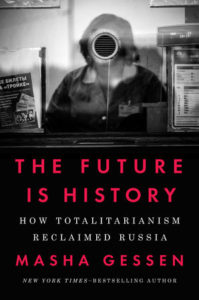
Masha Gessen, The Future is History
Russian-American journalist Gessen’s new book, already on the nonfiction shortlist for the National Book Award, is a withering look at the decline of her homeland under Vladimir Putin. NPR’s Scott Simon asks Gessen about Russian disinformation campaigns in the U.S. and Europe. “You know, all of us are interested in seeing our worldviews affirmed,” she says. “And Russia’s worldview—the Russian—the contemporary Russian ideology is that the whole world is rotten. Everybody is corrupt. Everything is for sale. Elections and the United States are just as rigged as they are in Russia. And so sowing the kind of disruption that Russia is sowing first and foremost pursues the goal of affirming that view.”
“Gessen fears that Russian society is dying under Putin—even life expectancy is shorter than in many developing countries,” writes Mary Ann Gwinn (Newsday). “It’s hard to imagine how any creativity, originality or innovation can survive such a societal straitjacket. And yet—perhaps most amazing is the resilience of the Russian resistance. Harassed, jailed, beaten, murdered—Russians still march against and protest the outrages of Putin’s regime. Will they prevail? Hard to say. One of Gessen’s subjects, a Russian psychoanalyst, concluded that, ‘This country wanted to kill itself. Everything that was alive here — the people, their words, their protest, their love—drew aggression because the energy of life had become unbearable for this society.’ Gessen vividly chronicles the story of a mortal struggle.”
Susan B. Glasser (Washington Post) writes, “By far the freshest and most revelatory parts of The Future Is History are those when Gessen takes us deep inside these past few years, as it becomes clear that Putin’s Russia is now what scholars call an aggressive, revisionist power, invading neighbors such as Georgia and Ukraine and squelching dissent at home. Gessen argues that two events stand out as decisive moments in Russia’s return to totalitarianism: the Bolotnaya Square protests of 2012 and the Crimea takeover of 2014. Her reporting on these events is particularly strong, and you feel right there on the streets with characters such as Masha and the two Nemtsovs as they realize, finally, that ‘budushchego net’—‘there is no future’ of the book’s title.”
Francis Fukuyama (New York Times Book Review) writes, “Gessen returns repeatedly to the question of what sort of regime exists in Russia today. As the subtitle of her book suggests, she believes that totalitarianism has reclaimed the country. Western political science associated totalitarianism with several features, including state terror, total absence of civil society outside the state, a centrally planned economy and domination by a single party. Gessen successfully shows how Putin’s Russia has gradually acquired these characteristics, though in muted and less extreme forms.”
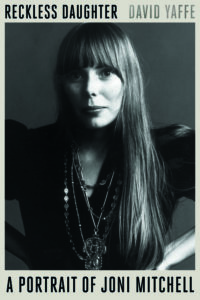
David Yaffe, Reckless Daughter: A Portrait of Joni Mitchell
Yaffe spent ten years writing his new biography of Joni Mitchell, and interviewed 60 some people, including Leonard Cohen. The most difficult interview? “Obviously, there was a huge challenge with Joni,” he tells Columbia Journalism Review’s Elon Green. “She tried to stop an interview in the middle, too. But I just hung in there. In 2015, she was cutting a lot of people out of her life, including people that didn’t want anything from her. It was our final encounter, and she was saying something, and I was having trouble keeping up. I didn’t know, when she was using a pronoun, to whom she was referring. And I guess I got it wrong, or I asked, Who’s this about? And she said, You have no attention span. This is it, I’m done. But I somehow kept it alive. We just kept talking.”
“Yaffe’s book is partly a study of what happens when a great artist, emerging as part of a scene, resists that scene’s assumptions and categories,” writes Dan Chiasson (The New Yorker). “The sixties had set a place for Joni Mitchell, but her essence was noncompliance. She would not fall in line behind fashionable causes; she deemed free love a ‘ruse for guys’ and performed at Fort Bragg during Vietnam. The classic example involves Woodstock. Mitchell missed the festival: she was booked to appear on The Dick Cavett Show, her major American television début, the next morning, and the reports of mud and throngs put her off. David Crosby and Stephen Stills, along with Grace Slick, leading Jefferson Airplane, were also on the broadcast. Mitchell looks more irritated at having to share the stage with them than disappointed to have missed out on doing so in a field of muck. Her song ‘Woodstock,’ which became a hit for Crosby, Stills, Nash & Young, was written in her hotel room, watching the festival on TV. She intended the song to be a dirge, not the anthem that it became in others’ hands.”
Jack Hamilton (The Atlantic) notes:
[W]hatever her listeners might dream or desire, Joni Mitchell was never in it for them, and she certainly wasn’t like them: She was a genius. As David Yaffe shows in his new biography . . . to approach her as an open book waiting to be read is to miss the essence of that genius. In the best full-length treatment of Mitchell yet published, Yaffe follows her from her childhood in postwar Saskatchewan all the way up to a Chick Corea concert last year, her first public appearance after suffering an aneurysm in 2015. Yaffe was granted extraordinary access to the famously standoffish Mitchell, as well as to many of her closest friends and collaborators, including Wayne Shorter, Herbie Hancock, Joan Baez, David Crosby, Judy Collins, and the late Leonard Cohen. Making the most of his proximity, he pulls off the feat that has eluded so many of his predecessors: He forges an intimacy with Mitchell on her own, uncompromising terms by truly listening to her, as closely and as generously as she’s always deserved.
Carl Wilson (Bookforum) has some quibbles: “Reckless Daughter is thoroughly researched, with original interviews with Mitchell as well as friends and collaborators across her life span. But its flaws in craft, tone, and focus leave it short of definitive, and a little maddening to read.”
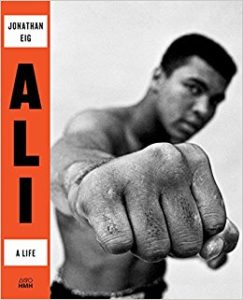
Jonathan Eig, Ali: A Life
The biographer of Lou Gehrig and Jackie Robinson is back with a 600-plus volume about the multifaceted and influential fighter Muhammed Ali. Of Ali’s comeback fight—the Fight of the Century on March 8, 1971 with Joe Frazier—Eig tells NPR’s Dave Davies, “This is one of the greatest and most vicious fights in boxing history and Ali loses, but he stays on his feet. He survives this thing. I think then you begin to see him as a martyr, as a hero, and somebody who gets knocked down and keeps coming back.”
Ali: A Life, Aram Goudsouzian (Washington Post) writes, “is the first comprehensive biography worthy of this titanic figure . . . Eig weaves together Ali’s athletic feats, cultural significance and personal journey. Fortified by hundreds of revealing interviews, Ali vigorously narrates the story of the man who transformed the landscape of race and sports.”
“Can any book do justice to a man who had so many faces?” asks Clive Davis (The Times of London). “Not content with being the greatest boxer of modern times, Muhammad Ali was a showman, a poet and a self-appointed global ambassador; a man who, in his pomp, championed extremist views about the separation of the races, yet ended his days as a Mandela-like symbol of racial unity. Jonathan Eig’s biography will not be the last word on The Champ, but it does a remarkable job of synthesizing the warring elements in Ali’s life.”
“Until yesterday’s publication of Ali: A Life, there was no life of Muhammad Ali, no comprehensive account of the man who called himself—and came to be called—‘The Greatest,’” writes Tom Junod (ESPN) “Now, where once yawned a vacuum, there now stands a cinderblock, the product of 400 interviews conducted over five years of archival research and shoe-leather detective work. The Ali who emerges from Eig’s biography is not the saint so many have made him out to be, but rather a figure whose humanity is earthy, complicated, fallible and thus, in these pages, restored.”
Cary Darling (Dallas Morning News) notes:
Eig travels from childhood to deathbed, painting an intricate portrait of a divisive, larger-than-hard-knock-life figure who, in his later years of public good will and Parkinson’s syndrome ill health, became a symbol of unity, even if the often incendiary issues that had animated him earlier in his life were as pertinent as ever. Much as last year’s lauded documentary about O.J. Simpson, O.J.: Made in America, viewed a successful black athlete through the convoluted prism of race, Ali isn’t just about the boxer’s knockdowns and knockouts but also the societal upheavals with which he shadowboxed.
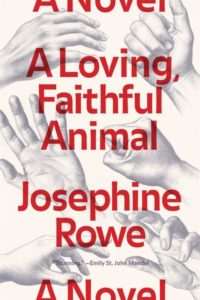
Josephine Rowe, A Loving, Faithful Animal
Rowe, whose story collection Tarcutta Wake was longlisted for the Frank O’Connor International Short Story Award, offers a first novel that examines the traumatic aftermath of the Vietnam War on generations of an Australian family.
“The sense of danger comes from the way Rowe, a former Stegner Fellow now living in Tasmania, weaves this family’s ecosystem into the wider southeast Australian wilderness, lending the story a feeling of urgency and rawness,” writes Rebecca Rand (Zyzzyva). “Every time you settle into the familiar narrative of suburban linoleum depression, a spider the size of a hand crawls across the ceiling. In this book characters can’t go for a walk without crunching cicada husks beneath their shoes, pass a fence without seeing a strung-up fox (both a trophy and a warning), or hear gunshots without wondering if someone finally got the giant black cat that’s been stalking the area.”
“A Loving, Faithful Animal is a compelling portrait of a family’s attempts to deal with the aftermath of the Vietnam war,” notes a judge in naming Rowe one of the The Sydney Morning Herald Best Young Australian Novelists for 2017. “It is pitch perfect. I couldn’t put it down.”
Samantha Hunt (New York Times Book Review) concludes:
This is a highly interior book, in which gorgeous, precise language encourages inner storms as the surface remains calm, and Rowe—introducing notions of airline flights, runaways, fast cars and motorcycles—asks whether we ever move fast enough to escape this deep damage.
Like the best of Breece D’J Pancake or W.G. Sebald, Rowe plants small moments from history as a soldier might bury land mines. What lies dormant beneath us? A massacre, a dead pet, a crime unchallenged. Rowe then waits for her characters to stumble home drunk or tired one night, tripping that memory wire, while we as readers watch the world explode.




















